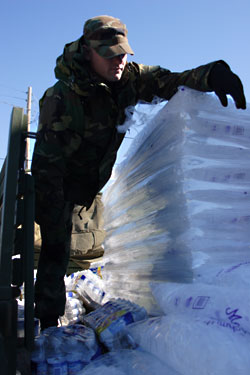 |
||||
 |
 |
|||
 |
 |
 |
||
 |
||||
 |
 |
|||
 |
 |
 |
||
| After the great flood there was a rainbow...and the believers | |||||
| Welcome Home Cafe New Waveland Cafe and Market |
Be PreparedThese are the things that I have found useful. If you are going in to this situation do what makes sense. Listen to people who have made similar trips. If you are going to go to a disaster area be prepared to take care of yourself. And be prepared to GIVE more than you take. |
 |
|||
Be physically in shape. You should be able to walk a reasonable distance, bend and lift a reasonable amount of weight (including your own gear). Start out healthy. If you are sick or immuno-compromised, do not go. Find another way to help. Look at the weather reports for the area. Bring appropriate gear for the entire time that you expect to be there. Check out the CDC's Website (http://www.cdc.gov/travel/) and your local health department. You may need innoculations. Bring your own shelter (a tent) and sleeping bag. Get a bag that is rated for 0°. The ones that are rated for 30° are a waste of money and will not keep you warm enough even in though Mississippi has moderate winter temperatures. Assume that you will not be able to find gasoline in the area. Bring extra gas, or buy it while you are outside of the disaster zone. Bring a MAP. Check the AAA in your area for maps, or at least use MapQuest.com. Assume that you may not have clean water. Bring at least 1 gallon per person. Bring water purification tablets. Bring a work knife (folding knife-if you put it in your CHECKED bags you can legally take it on a plane), flashlight, lighter, bleach wipes, medical gloves, NC95 face masks and large plastic garbage bags. Bring baby wipes for personal hygiene. Wash your hands and sanitize often. If you have eating utensils available, use them. Take time to take care of your body--that means eat and sleep. If a minor injury or illness occurs treat it immediately (even if you would just ignore it at home). Do not allow it to escalate and slow down you--AND everyone you are with. Do not share drinking bottles, cigarettes or other things where you are “swapping spit.” Ziplock plastic bags are your friend. Put everything in plastic--ID, credit and phone cards, maps, eletronic equipment, flashlight ...everything. Put clothing in big plastic bags in case your gear gets wet. Use common sense and barrier protection (gloves, masks, tyvek suits) when handling hazardous materials--this includes everything from a refrigerator full of rotted food to cleaning up a cut on the arm of a travel companion. Use your judgement, your instincts, your intuition and common sense. Just because something is scarey doesn’t mean that you shouldn’t do it...or that you should. Keep your gear packed and stowed neatly in case you need to get to something quickly. Also, it helps prevent loss and breakage of things you REALLY need. Here is my equipment list for a 5 day stay in late November. You can pack this list to get on an airplane.
|
|||||
Devastation | Welcome Home Cafe | Arkansas National Guard |
|||||